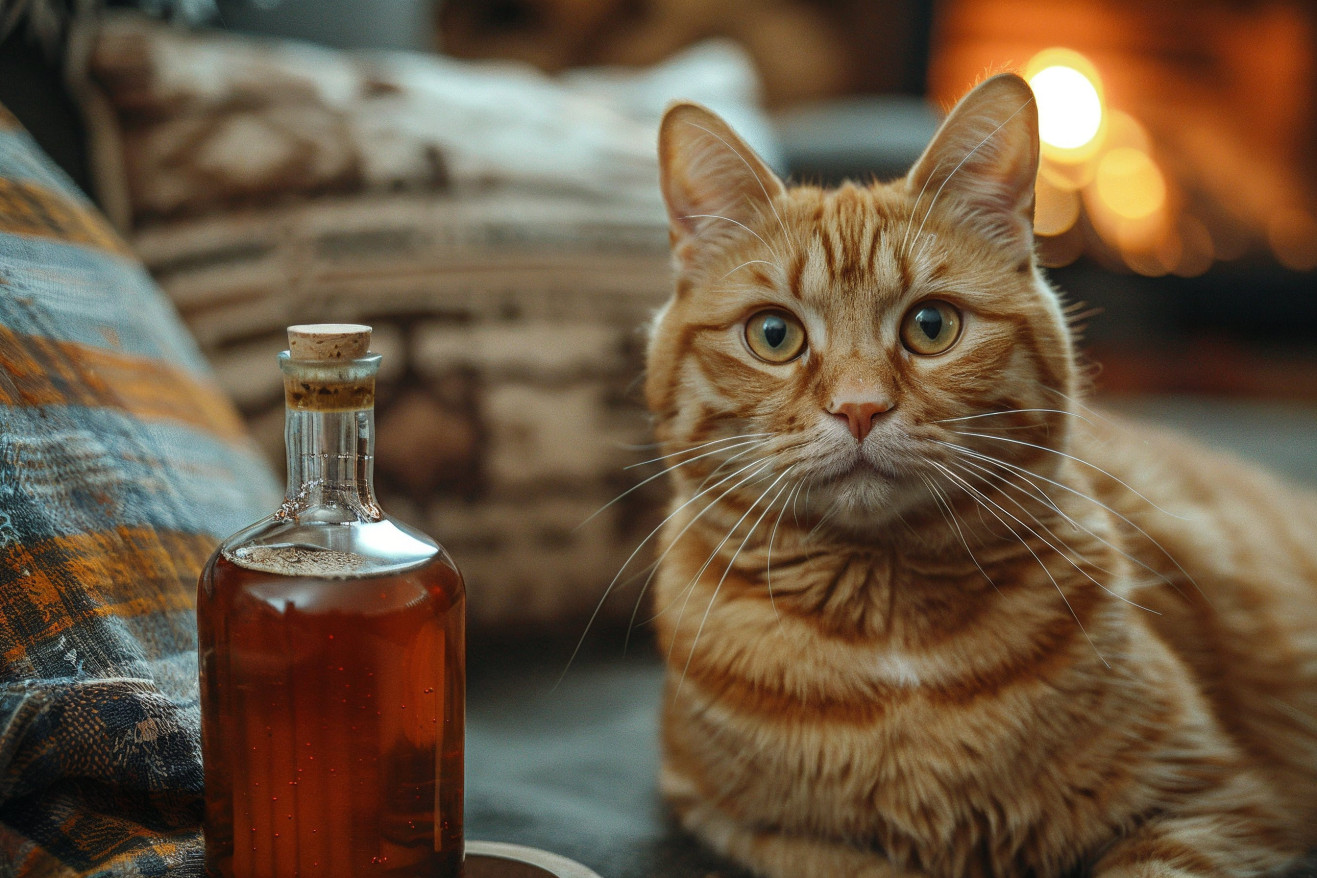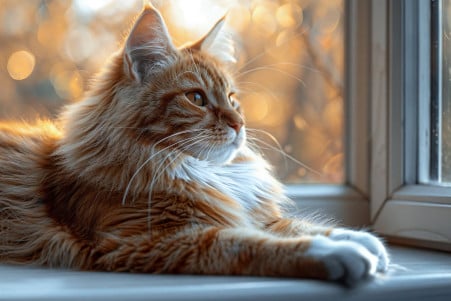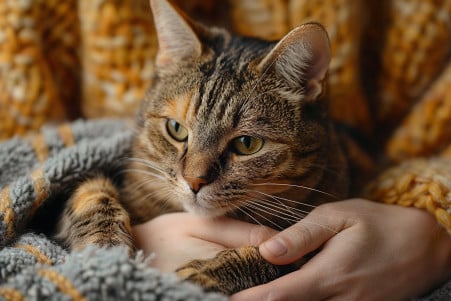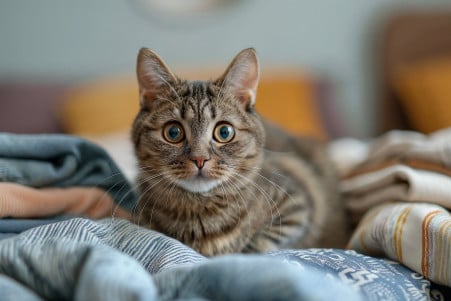Why Does My Cat Smell Like Maple Syrup? Causes and Concerns
6 May 2024 • Updated 6 May 2024

If you have ever caught a whiff of your cat and thought they smelled like maple syrup, you may be wondering why your cat has a maple syrup smell. The reason for this unique odor is often a combination of fatty acids and glucose that has built up in your cat's skin and coat as a result of diabetes or another metabolic disorder; however, in rarer cases, the smell could be a sign of maple syrup urine disease - a genetic disorder that is both rare and serious and requires medical treatment.
To better understand this strange occurrence and what it could mean for your cat, we will take a look at the scientific studies that have been done on feline metabolism, diabetes, and genetic disorders that could lead to a maple syrup smell. We will also discuss ways to help your cat smell better and stay healthier, including grooming and dietary changes. By learning about the science behind this issue, you can learn to recognize potential health problems and ensure that you are doing everything you can to help your cat live their best life.
Why does my cat smell like maple syrup?
Diabetes Mellitus: A Common Cause of Sweet Odors
Diabetes mellitus is a common condition in cats that can cause a sweet, syrupy smell. According to Catster, an estimated 0.2% to 1% of cats will develop diabetes at some point in their lives, with feline obesity being a major risk factor. If left untreated, diabetes can lead to a life-threatening condition known as diabetic ketoacidosis (DKA). As VCA Hospitals notes, DKA causes the body to produce ketones, which can cause the cat's breath to smell sweet and unusual.
It's important to watch for other signs of diabetes, including increased thirst, urination, and weight loss, in addition to the maple syrup smell. Early veterinary care is important for an accurate diagnosis and treatment. This will typically include insulin therapy and dietary changes to help manage blood sugar and prevent complications, as described by Cornell's Feline Health Center.
Regular vet visits and ongoing monitoring can help ensure that feline diabetes is well-controlled. By following the treatment plan and watching for the return of the sweet smell, pet parents can help make sure their cat stays healthy and prevent the progression of this common metabolic condition.
Maple Syrup Urine Disease (MSUD): A Rare Genetic Disorder
Maple syrup urine disease (MSUD) is a rare inherited metabolic disorder characterized by the body's inability to metabolize certain amino acids. MedlinePlus explains that MSUD is the result of a genetic mutation that disrupts the body's ability to produce certain enzymes, which causes toxic byproducts to accumulate in the blood and urine.
According to the NHS, the classic signs of MSUD include a distinctive maple syrup smell in bodily fluids, as well as poor feeding, lethargy, seizures, and if left untreated, brain damage. Rare Diseases notes that there are different forms of MSUD, including classic and intermittent forms that are less severe, which are based on the degree of enzyme deficiency.
Early detection and treatment, which may include a special low-protein diet and in some cases, a liver transplant, are necessary to prevent life-threatening complications. According to PMC, more than 107 disease-causing mutations have been found for MSUD, which highlights the importance of early intervention for this rare but life-threatening genetic condition.
Diagnosing Maple Syrup Odor
If you smell a maple syrup odor on your cat, make sure to take them to the vet as soon as possible. JustAnswer explains that the vet will likely start with a physical exam, urinalysis, bloodwork, and possibly imaging to rule out diabetes, kidney disease, and urinary tract infections.
A complete medical history and detailed description of the odor can help the vet determine the cause of the maple syrup odor. ScienceDirect explains that maple syrup urine disease (MSUD) can be hard to diagnose in cats because it is mostly studied in humans.
No matter the cause, it's important to get an accurate diagnosis so that the underlying condition can be treated and managed properly. With the help of a vet, cat parents can figure out why their cat has a maple syrup odor and work to treat the health issue.
Treatment and Prevention of the Underlying Condition
The treatment of a cat's maple syrup odor will be based on the underlying cause, which could be diabetes mellitus or the rare genetic disorder maple syrup urine disease (MSUD).
For diabetes, Catster explains that insulin therapy, dietary changes, and close monitoring are key to maintaining healthy blood sugar levels and preventing complications. Diabetic ketoacidosis, a life-threatening condition that causes the maple syrup odor, can occur if diabetes is not managed.
If the cause is MSUD, the NHS says that a low-protein diet and possibly amino acid supplements are necessary to help the body rid itself of the toxic substances that build up. Cleveland Clinic also notes that liver transplantation is a potential treatment for severe cases of MSUD.
No matter what the underlying cause is, the Cornell Feline Health Center explains that it's important to work with your vet and stick to the treatment plan to ensure that your cat's condition is managed and the maple syrup odor doesn't come back.
Prevention and General Cat Health
Preventative care and regular vet visits are important to catch any potential health problems early, says Catster. In addition, a healthy diet, regular exercise, and maintaining a healthy weight can help prevent diabetes and other health issues that could lead to a maple syrup smell.
Cats.com notes that regular grooming and cleanliness can help prevent odors and make it easier to notice any strange smells. In addition, changes to the environment, like using air purifiers and covered litter boxes, can help reduce any unwanted odors in the home.
Pet parents should make sure to notice any changes in their cat's behavior or physical condition and consult a vet if they have any concerns, according to the Oakhurst Veterinary Hospital. By staying on top of their cat's health and happiness, pet parents can help prevent the health issues that could lead to a maple syrup odor and ensure their cat is healthy.
Conclusion: Dealing With the Maple Syrup Smell
The causes of a maple syrup-like odor in cats can range from more common issues like diabetes mellitus to the rare genetic condition maple syrup urine disease (MSUD). It is important to see a vet right away to get an accurate diagnosis and proper treatment.
With the right medical treatment, dietary changes, and ongoing care, people can live with and manage these conditions. There are also things people can do to help prevent these conditions, such as going to regular check-ups and living a healthy lifestyle.
It is important for cat owners to stay on top of their pet’s health and to see a vet if they notice any strange odors or other changes in their cat. By being proactive and working with medical professionals, cat owners can help make sure their pets are healthy and address any issues related to a maple syrup-like smell.


